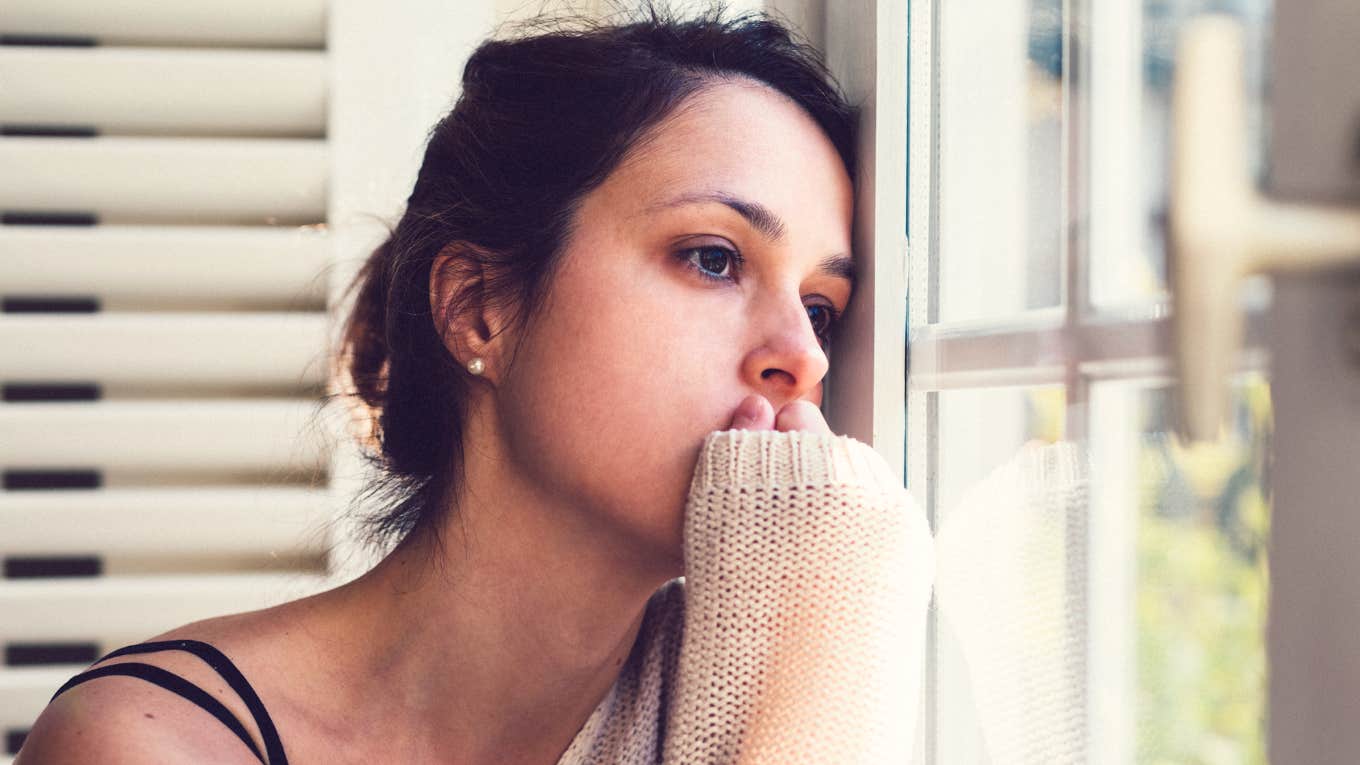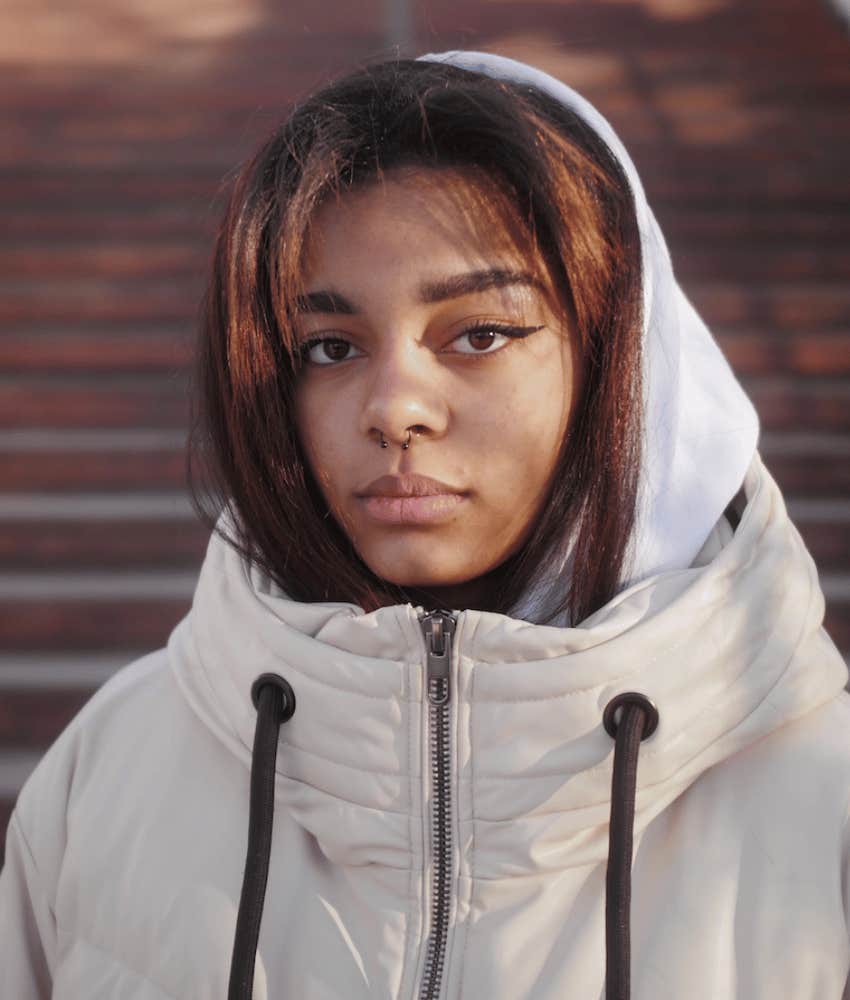9 Subtle Signs Of Depression I Was Too Depressed To Notice
Some signs of depression are easy to miss, especially when looking from the inside out.
 martin-dm | Canva
martin-dm | Canva Every time I slip into a depression, it feels a little different, which can make it a little more difficult to know if I have depression.
My first truly brutal episode of clinical depression hit when I was about 18 years old, and it was terrifying, but because it followed the more traditional signs of depression, it was easier for me to identify than it has been at other times.
Back then, I remember wondering if I'd ever be happy again or whether I might be losing my mind. I had panic attacks, and general anxiety, and cried a lot. I didn't want to leave the house, and I couldn't focus on school because I was plagued with really dark, depressing thoughts. (The National Institute of Mental Health has a list of the most common signs and symptoms of depression.)
I tried every medication the doctor suggested and finally found one that worked. Thank God. After two or three weeks, it felt like I could breathe again, and my skin suddenly didn't hurt anymore. I hadn't even noticed that it was hurting in the first place.
I was on the drug for years, then, when I had children in my late 20s, I went off of it for years (with the guidance of my prescribing psychiatrist), and I felt okay. But just recently, the darkness snuck up on me again, and I wasn't expecting it at all.
Here are the subtle signs of depression I was too depressed to notice:
1. My Spotify playlist got super, super depressing
I know this seems silly, but, with every passing day, my Spotify playlist got darker and darker.
My formerly mellow playlist went from quiet love songs to what Cher Horowitz from the movie Clueless called "complaint rock." This was some minor-key stuff. And the more of these sad songs I added to my playlist, the more sad songs Spotify would recommend, so it became a rabbit hole of misery.
I listen to that playlist now and I'm like, "Holy crap, this should've been a major red flag!"
2. Friendship seemed like way too much work
 VN_KK via Shutterstock
VN_KK via Shutterstock
I'm one of those women who has a few great friendships that I work hard to maintain and a bunch of really awesome women in my life who form a powerful community. But, as the depression crept in, the idea of being with even my best friends became overwhelming.
You know that feeling like you've had a horrible day at work and all you want to do is get into bed with Netflix? That's how I felt every single day. I even tried to avoid people if I saw them in the grocery store or at school drop-off.
They say when you're depressed, you need your friends more than ever. WebMD offers suggestions on how to maintain your friendships during a bout of depression, suggesting that, at first, you may want to seek out just a few people to talk to about what you're going through.
"Don't choose only one person, since that can be overwhelming for them," they explain. "Talk to all of them about your depression and what you've been feeling. Let them know it's fine to check in on you once in a while to make sure you're doing OK. Or they can help with your treatment by reminding you to take your medicine or by driving you to doctor appointments."
I was so depressed, that I wouldn't have even known how to ask for help from them. Luckily, once I stopped avoiding the people in my life, they were there for me and I was able to let them in.
3. I felt like I was never going to be in love again, and I didn't even care
When I was in my darkest darkness, I felt nothing romantic for my husband. I loved him, but my heart felt like a flat line.
For perspective, I'm that annoying woman who thinks my husband is the hottest and greatest guy on the planet. I moon over him and count the minutes until he comes home. It's sickening, I know, but it's just the truth.
So, when that disappeared, I finally realized that things were bad.
4. I stopped noticing the quietly wonderful things in life
My depression wasn't marked by big bouts of crying, and I was still able to laugh with my coworkers and enjoy funny movies. But I stopped feeling bliss in the simple moments of joy like I felt when I would see my sons in their twin beds both reading quietly or when I heard their laughter and plotting when they would go outside to catch lizards.
Now that my happiness is back, I realize what a strong sign of depression it was that I could no longer find grace in those lovely, everyday moments.
5. I lost a whole bunch of weight without trying (or noticing)
Some people might see this as a great thing, but it was a big sign of depression for me. I wasn't trying not to eat, I just felt full quickly and nothing tasted all that great.
"'Loss of appetite can be an early sign of depression or a warning of a depression relapse. On the other hand, some people can't stop eating when they are depressed,' says Gary Kennedy, MD, director of geriatric psychiatry at Montefiore Medical Center. 'A sudden change in weight, either gaining or losing, can be a warning of depression, especially in someone who has other symptoms of depression or a history of depression.'"
It wasn't until I needed to buy a new belt to keep my jeans on that I even realized I'd lost weight. And, after decades of disordered eating and body image issues, to have lost weight without noticing was a major indicator that something wasn't right.
6. I disappeared into crowds
This one is hard to explain, but now that I'm happy again, it feels powerful. I'm the kind of woman who takes up space. I have a loud laugh and I'm not at all shy.
I make friends in line at the grocery store, and everyone at my neighborhood Starbucks knows my name, and my drink, and tells me all the store gossip when I come in. When I was depressed, nobody noticed me. Not just because I didn't reach out, but because people didn't even seem to see me.
Now that I'm back to myself, I feel connected to the people around me again. Strangers smile when I walk past, and I smile back. It's so simple but makes such a huge difference.
7. My heart never stopped racing
When my friend's mom died, she mentioned how the grief had made her feel like her heart was always fluttering. I thought this was metaphorical or a reference to the very real pain of heartbreak.
But after my dog Gretel died, my heart started racing and it never slowed down. Even when I was camped out in my bed just watching TV, my heart quietly fluttered in panic in my chest.
I didn't have full-blown panic attacks. Instead, I just lived in a perpetual state of low-grade anxiety that became so normal I barely noticed until it stopped. While this racing heart symptom was most likely caused by anxiety, scientists have recently discovered that depression can have serious effects on your cardiovascular health.
Research from the American Heart Association found that "people with symptoms of depression have a higher risk for a heart rhythm disorder known as atrial fibrillation, which increases the risk for stroke."
The study notes that "exactly how depression disrupts heart function remains unclear, researchers said, but several possible mechanisms have been suggested. These include increased levels of inflammation as well as elevated levels of certain hormones that directly or indirectly interfere with the heart’s ability to stay in a normal rhythm."
It's important to mention that this is considered preliminary research — which means that, at this point, there's probably nothing to panic about if you have depression or a racing heart (though it's always good to check in with your doctor). It simply means that doctors and scientists should look further into the connection to learn how depression may be linked to cardiovascular health.
8. Work became really, really hard
 GaudiLab via Shutterstock
GaudiLab via Shutterstock
I have ADHD, so focus is something that requires considerable effort from me on a normal day. But depression made it even harder.
At my job, I also worried about everyone being mad at me, that I wasn't up for the task, or that I was about to screw something up. I felt profoundly inadequate, even when I was doing good work.
Now I'm able to enjoy work again, and it feels great. I'm so grateful for my job and my community of co-workers. Feeling valued and useful is so vital when you're fighting depression.
9. I lost sight of my gratitude
Every day of my life, I feel grateful. Not just running through a checklist of things I know I should be glad to have. But a deep and quiet sense of recognizing what's good in my life.
It wasn't that I wasn't grateful when I was depressed, it was that I was numb to the sort of joy and love that reminds you of just how fortunate you are.
Gratitude isn't something that can be forced, which is the same as happiness. The people who say we need to choose to be happy are full of it, just like the people who say that you can simply decide to be grateful.
Sure, it takes practice, but when you're depressed, sometimes you can't be grateful (or happy) until after you've sought treatment. No matter how badly you may want to.
How to know if you have depression if your symptoms don't follow the typical pattern
Because I'd been off meds so successfully for so long, I thought I could somehow outrun the signs of depression. After all, I didn't have typical symptoms.
It started when my dog passed away after only a week of being sick. The grief was sudden and excruciating. Gretel was a Jack Russell Terrier-and-poodle mix who had been with me for more than fifteen years. She was a huge personality who won over everyone she met. It was impossible to imagine being without her. I wondered if I could ever be happy again.
Anyone who doesn't understand how a person could be that sad about a dog never had a dog like this. After a while, the pain became more bearable, and I thought I would be happy again soon. But, instead of healing, I felt like I was slowly sinking into the earth. Like someone was putting heavier and heavier weights around my ankles when I wasn't looking.
My entire existence felt heavy. I wasn't okay, and those words kept running through my head: I'm not okay. I'm just not okay.
Looking back, I can now see so many signs of depression that I just hadn't seen. I was too depressed to recognize them.
Now that I'm feeling better, I think it's important to share what led me to finally realize I was depressed so that other people might be able to recognize their signs and know to ask for help. Because asking for help is everything. I'm so glad I did because it helped get me to a place where I can finally remember what it's like to be happy.
And here's the thing: Waiting for my signs of depression to fit a standard mold was never going to work for me. That's why it's so important we all prioritize our mental wellness, and not be afraid to ask the people around us for some help.
My mom finally stepped in and said she thought I was depressed, all while other people had no idea because I wasn't crying or moping or wearing all black like a stereotypically depressed person. I am happier now, and I hope other people can find the same hope.
Joanna Schroeder is a parenting writer, editor, and media critic with bylines in The New York Times, The Boston Globe, Esquire, and more. Her forthcoming book Talk To Your Boys: 16 Crucial Conversations To Have With Your Tween & Teenage Sons will be available in September 2025.

